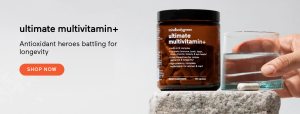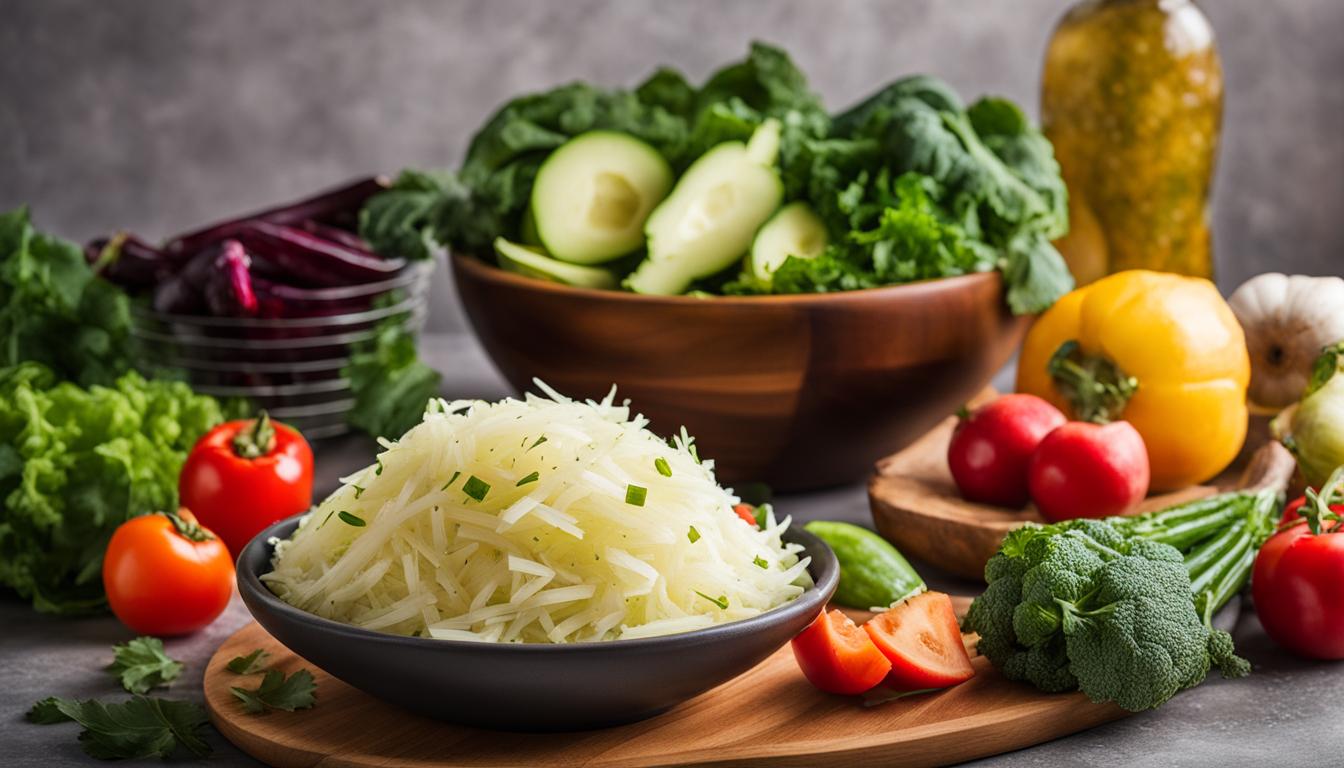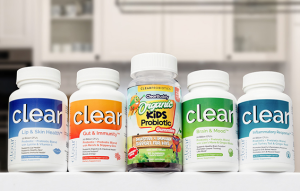Table of Contents
ToggleEmbarking on a journey into the world of fermented foods reveals sauerkraut as a standout choice for promoting gut health.
For me, the best time to eat sauerkraut for gut health is early in the morning.
Consuming sauerkraut as part of your breakfast routine can maximize its probiotic benefits, supporting digestion and gut health effectively throughout the day.
This traditional delicacy, crafted from fermented cabbage, is more than just a tangy accompaniment to meals; it’s a probiotic powerhouse, instrumental in nurturing digestive wellness.
Our exploration delves into sauerkraut’s nutritional profile, the intricacies of its fermentation process, and the distinctions between homemade and store-bought versions, highlighting how this humble food can be a key player in maintaining a healthy gut.
Key Takeaways:
- Sauerkraut is a probiotic-rich food that offers numerous health benefits for the gut.
- The fermentation process of sauerkraut creates beneficial bacteria that promote a healthy gut microbiome.
- Consuming sauerkraut early in the morning is considered the best time for optimal digestion.
- Regular consumption of sauerkraut is key to maintaining gut health.
- Start your day with sauerkraut to jumpstart your gut health and set the tone for the day.
What is Sauerkraut?
Sauerkraut, commonly known as ‘sour cabbage,’ transforms fresh cabbage into a fermented dish often served alongside sausages or hot dogs as a side dish or condiment.
To make sauerkraut, one ferments cabbage in a salt brine for several months. This process allows naturally occurring bacteria and yeast to break down the carbohydrates in the cabbage, producing lactic acid.
This fermentation not only creates sauerkraut’s sour flavor and preserves the cabbage but also generates probiotics, tyramines, vitamins, and minerals.
The transformative journey of cabbage during fermentation involves converting its natural sugars into lactic acid.
This conversion gives sauerkraut its tangy taste and distinctive aroma while enhancing the nutritional value of the cabbage, thus making sauerkraut a nutrient-dense food for gut health.
| Nutrients | Amount per 100g |
|---|---|
| Calories | 19 |
| Carbohydrates | 4.9g |
| Dietary Fiber | 2.9g |
| Vitamin C | 24% of the daily value |
| Vitamin K | 16% of the daily value |
| Vitamin A | Varies |
| Sodium | 661mg |
| Potassium | 170mg |
| Calcium | 34mg |
| Iron | 0.8mg |

Store-Bought vs. Homemade Sauerkraut
Sauerkraut clearly differs between store-bought and homemade varieties. Both offer the tangy flavor and versatility of fermented cabbage, but key factors distinguish them.
Store-bought sauerkraut serves as a convenient option for those lacking time or resources to make their own.
Available in cans or jars at grocery stores, this variety often undergoes pasteurization during canning.
The pasteurization process, which uses heat to kill bacteria, unfortunately, destroys the active probiotics in the sauerkraut, potentially compromising its health benefits.
Homemade sauerkraut maximizes its health benefits. This method involves fermenting fresh cabbage in a salt brine for several weeks to months, allowing natural bacteria to develop probiotics.
Since homemade sauerkraut avoids pasteurization and heat, it retains active probiotics and offers higher nutritional value than store-bought versions.
Also, home fermentation provides greater control over the flavor and texture, enabling customization to personal tastes.
Choosing homemade sauerkraut ensures full health benefits, including improved digestion and gut health. The probiotics in homemade sauerkraut nourish the gut microbiome, aid in nutrient absorption, and support overall digestive function.

Nutritional Content of Sauerkraut
Sauerkraut delivers a nutritious punch with every bite.
In every 100 grams, it packs only 19 calories, making it an ideal low-calorie choice for health-conscious diets.
This fermented cabbage is brimming with 4.9 grams of carbohydrates for sustained energy release throughout the day.
It’s also an excellent source of dietary fiber, offering 2.9 grams per 100 grams serving, aiding in digestion.
Nutrient-rich, sauerkraut provides essential vitamins such as vitamins C, K, and A.
A serving of 100 grams supplies 24% of the recommended daily value of vitamin C, vital for a robust immune system.
It also contributes 16% of the daily value of vitamin K, which is necessary for blood clotting and bone health, and includes vitamin A, crucial for eye health and cell development.
Sauerkraut doesn’t skimp on minerals either.
It contains sodium, potassium, calcium, and iron, each playing a crucial role in various bodily functions.
Sodium maintains fluid balance, potassium promotes heart health, calcium ensures strong bones and teeth, and iron is essential for transporting oxygen throughout the body.

Health Benefits of Sauerkraut
Sauerkraut is a powerhouse of health benefits, providing a wide range of advantages for our well-being. Let’s explore the incredible ways sauerkraut can support and enhance our overall health.
Gut Health:
One of the key benefits of sauerkraut is its positive impact on gut health.
Packed with probiotics, sauerkraut aids in digestion, promotes the absorption of nutrients, and helps prevent constipation.
By restoring and maintaining a healthy balance of gut bacteria, sauerkraut supports optimal gut function and contributes to a healthier digestive system.
Immunity Booster:
The probiotics found in sauerkraut also play a crucial role in boosting our immune system.
These beneficial bacteria help strengthen our body’s natural defense mechanisms, protecting us against harmful bacteria and toxins.
By fortifying our immune response, sauerkraut contributes to overall immunity and helps safeguard our health.

Brain Health:
Emerging research suggests that sauerkraut may have positive effects on brain health.
The probiotics in sauerkraut have been linked to a reduction in anxiety and depression symptoms.
By nurturing a healthy gut-brain connection, sauerkraut supports mental well-being and promotes a positive mood.

Weight Loss Aid:
If you are aiming for weight loss or weight management, sauerkraut can be a valuable addition to your diet.
With its low-calorie content and high fiber content, sauerkraut provides a satisfying and nutritious option.
The fiber in sauerkraut helps promote feelings of fullness and aids in digestion.
Liver and Bone Health:
Sauerkraut offers benefits beyond digestion and immunity. It also promotes liver health and supports the body’s detoxification processes.
Additionally, sauerkraut contains minerals like calcium and potassium, which are essential for maintaining strong and healthy bones.
Disease and Cancer Prevention:
Sauerkraut’s rich nutritional profile and powerful antioxidants make it a natural ally in disease prevention.
The high levels of antioxidants found in sauerkraut also help protect against cell damage and reduce the risk of cancer.
Overall, sauerkraut is a true champion when it comes to promoting our health and well-being.
Its numerous benefits for gut health, immune function, brain health, weight management, liver health, bone strength, and disease prevention make sauerkraut an excellent addition to any diet.
Risks of Consuming Sauerkraut
Sauerkraut undoubtedly offers numerous health benefits as a food choice, but it’s important to be aware of and mindful of potential risks associated with its consumption.
The high sodium content in certain store-bought varieties of sauerkraut poses one such risk.
Consuming too much sodium can negatively impact cardiovascular and renal health, often leading to increased blood pressure.
Therefore, individuals with conditions like high blood pressure should consume sauerkraut cautiously and keep a close watch on their sodium intake.
Some individuals might also experience side effects from consuming sauerkraut, such as diarrhea, flatulence, headache, itchy skin, sneezing, runny nose, or high blood pressure.
The Optimal Time to Eat Sauerkraut and Why
Eating sauerkraut at the beginning of a meal is ideal.
This practice lets the enzymes in sauerkraut initiate the digestion process, aiding in the breakdown of food.
Eating sauerkraut early in a meal allows its probiotics and enzymes to start working in the stomach immediately, supporting digestion.
This timing preserves sauerkraut’s beneficial properties, optimizing its impact on gut health and digestion.
So, why does consuming sauerkraut at the meal’s start benefit you? Sauerkraut’s enzymes aid in digesting proteins, fats, and carbohydrates in your meal.
This assistance enhances nutrient absorption and promotes overall digestive health.
Furthermore, consuming sauerkraut early ensures that its probiotics establish themselves in your gut, fostering a favorable environment for beneficial bacteria.

How to Incorporate Sauerkraut into Your Daily Diet
To incorporate sauerkraut into your daily diet, consider these creative and tasty options:
- Side Dish: Serve sauerkraut as a flavorful side dish with your meals. Its tangy taste complements various main courses.
- Salads and Sandwiches: Mix sauerkraut into salads or sandwiches for a crunchy, flavorful addition. It pairs well with different vegetables, meats, and cheeses.
- Breakfast Topping: Top poached eggs or spread over avocado toast with sauerkraut for a unique breakfast twist.
- Garnish for Savory Dishes: Use sauerkraut as a garnish on burgers, tacos, or other savory favorites to add a tangy crunch.
- Soup Ingredient: Stir sauerkraut into soups for added flavor and a probiotic boost.
- Recipe Ingredient: Experiment with sauerkraut in various recipes, such as stews, savory pancakes, or casseroles, to explore its versatility in cooking.
A Word from HealthyVibe
Actively integrating sauerkraut into your daily diet offers a multitude of health benefits, particularly for gut health.
Sauerkraut, with its unique fermentation process, not only adds a delicious tangy flavor to various dishes but also contributes significantly to your overall well-being.
Whether you choose to enjoy it as a side dish, a topping, or an ingredient in your meals, sauerkraut stands out as a nutrient-dense food, essential for maintaining a healthy and balanced diet.
FAQ
What Are the Best Times to Consume Sauerkraut for Optimal Gut Health?
Consuming sauerkraut early in the morning, particularly as part of your breakfast routine, can maximize its probiotic benefits. This timing helps kickstart digestion effectively and supports your gut health throughout the day.
How Does Sauerkraut Benefit Digestive Health?
Sauerkraut, packed with probiotics, aids significantly in digestion. It promotes nutrient absorption, helps prevent constipation, and maintains a healthy balance of gut bacteria, contributing to optimal gut function and a healthier digestive system.
Can Sauerkraut Help with Weight Management?
Yes, sauerkraut can aid in weight loss and management. Its low-calorie content and high fiber levels provide a satisfying and nutritious option, promoting feelings of fullness and aiding digestion, making it an excellent addition to a weight-conscious diet.
What Nutrients Are Found in Sauerkraut?
Sauerkraut is rich in essential nutrients, including vitamins C, K, and A, and minerals like sodium, potassium, calcium, and iron. It is also low in calories and high in dietary fiber, making it a nutritious choice for various dietary needs.
Are There Any Risks Associated with Consuming Sauerkraut?
While sauerkraut offers numerous health benefits, it’s important to consider its high sodium content. Individuals with conditions like high blood pressure should consume sauerkraut cautiously. Some people might also experience mild side effects such as flatulence or digestive discomfort.










